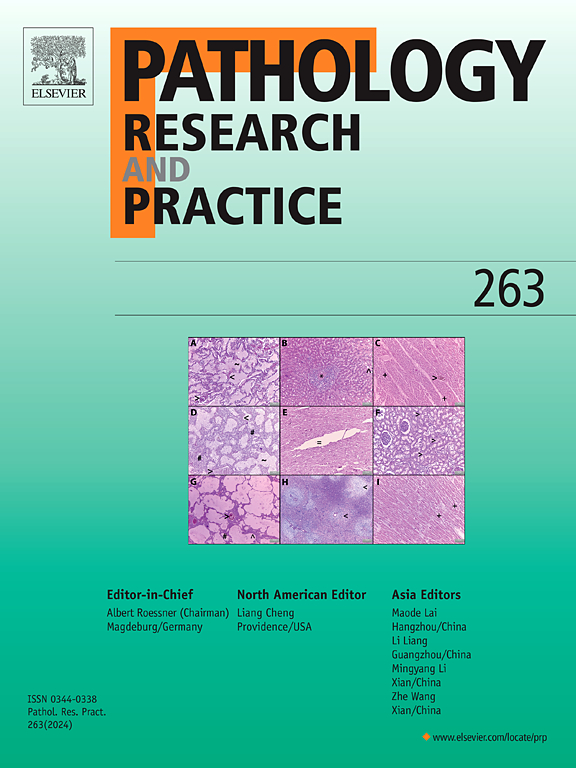Detection of metastatic breast carcinoma in sentinel lymph node frozen sections using an artificial intelligence-assisted system
IF 2.9
4区 医学
Q2 PATHOLOGY
引用次数: 0
Abstract
We developed an automatic method based on a convolutional neural network (CNN) that identifies metastatic lesions in whole slide images (WSI) of intraoperative frozen sections from sentinel lymph nodes in breast cancer. A total of 954 sentinel lymph node frozen sections, encompassing all types of breast cancer, were collected and examined at our institution between January 1, 2021, and September 27, 2022. Seventy-two cases from a total of 954 cases, including 50 macrometastases, 16 micrometastases, and 6 negatives, were selected and annotated for training a model, which was a self-developed platform (EasyPath) built using R 4.1.3 accompanied by Python 3.7 as the reticulate package. Another 105 metastasis-positive and 80 metastasis-negative cases from the remaining 882 cases were collected to validate and test the algorithm. Our algorithm successfully identified 103 cases (98 %) of metastases, including 85 cases of macrometastases and 18 cases of micrometastasis, with the inference time averaging 87.3 seconds per case. The algorithm correctly identified all of the macrometastases and 90 % of the micrometastases. The sensitivity for detecting micrometastases significantly outperformed that of the pathologists (p = 0.014, McNemar’s test). Furthermore, we provide a workflow that deploys our algorithm into the daily practice of assessing intraoperative frozen sections. Our algorithm provides a robust backup for detecting metastases, particularly for high sensitivity for micrometastases, which will minimize errors in the pathological assessment of intraoperative frozen section of sentinel lymph nodes.
求助全文
约1分钟内获得全文
求助全文
来源期刊
CiteScore
5.00
自引率
3.60%
发文量
405
审稿时长
24 days
期刊介绍:
Pathology, Research and Practice provides accessible coverage of the most recent developments across the entire field of pathology: Reviews focus on recent progress in pathology, while Comments look at interesting current problems and at hypotheses for future developments in pathology. Original Papers present novel findings on all aspects of general, anatomic and molecular pathology. Rapid Communications inform readers on preliminary findings that may be relevant for further studies and need to be communicated quickly. Teaching Cases look at new aspects or special diagnostic problems of diseases and at case reports relevant for the pathologist''s practice.

 求助内容:
求助内容: 应助结果提醒方式:
应助结果提醒方式:


